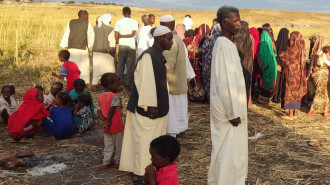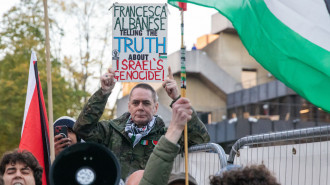
Life after death: Grieving families of Beirut blast victims describe their loss and lives a year after the tragedy

August 4 is no longer a regular date for the Lebanese. On this day last year, 2,750 tons of ammonium nitrate, unsafely stored at the state-managed Port of Beirut, exploded. The blast killed more than 200 people, injured 7,000 others, and devastated half of the city.
The trauma of the explosion cut deeper than one could tolerate – especially for the families of the victims, who no longer look at life the same way after they suffered heavy losses.
Antoine Barmaki
Young at heart, lively and energetic in nature, 75-year-old Antoine Barmaki, seemed to his family that life would never get enough of him. Until it did.
His daughter, Carole Kozah, described her late father as being the life of the party. His presence was necessary for every family event as he would be the first on the dance floor and the one who always encouraged his kids to enjoy life and let go of financial hangups.
He was passionate about travelling and service for others.
"He was more than just a father," his daughter stated. "He cared not only for his kids but for his children's children too. Everyone in the family and outside called him Daddy for a reason," Carole told The New Arab.
After his death, the entire family was hit with a strong wave of sadness and misery. Carole explained that their lives do not feel the same anymore. Despite their efforts to remain strong for their families, even the grandchildren weren't able to cope and found it hard to move on as if nothing happened.
The event did not only steal the life and heart of the Barmaki family, but it also made life intolerable.
"Our outlook on life changed, we are starting to hate the life we live. We miss his presence a lot so we try to not meet up too much so that his absence isn't amplified. But we need to remember that he's looking down on us and he would want us to be happy, " the disheartened daughter said.
Imad Zahreddin
Hardworking and loving father of four, Imad Zahreddin was working at his management office at the Beirut port when the blast happened. His younger brother, Mahdi Zahreddin, 23-years-old, described his older sibling as someone who always rushed to help others which explained why he was one of the first to help the firefighters on that day.
"The trauma of the explosion cut deeper than one could tolerate and especially for the families of the victims"
"Imad prioritised family over everything. He would always want us to get together. For that reason, he built a house for us in the south so that the whole family would have somewhere to stay in the summer," Mahdi told The New Arab.
The loss of his brother was more like losing the backbone of the family, he added.
They used to rely on him for everything, from solving daily issues, planning an outing, or needing financial help.
Life now for the Zahreddin family is plain sadness. The kids go to their father's grave and wait for him to come back to life, his siblings go there to express how much they need him. As for his mother and wife, they're both unable to cope. The wife constantly wishes she had died, meanwhile the mother copes by speaking to her son's picture daily.
"We're ready to do anything for him to come back," the grieving brother added.
Gaia Fodoulian
For 29-year-old Gaia Fodoulian, rescuing dogs was a top priority but her family always came first.
Her sister Mariana Fodoulian, described her sister as fun, social and loud. They would do everything together and on the day of the blast, they were going shopping together with some friends but Mariana, who worked as a veterinarian was running late.
Gaia studied product design in Italy but she had a soft spot for Lebanon which made her come back. After that, she worked with her mother at Leticia gallery in Hamra, Beirut. The mother-daughter bond was very strong as the victim would call up her mum several times during the day to update her on every detail.
Before she died, Gaia was preparing for an exhibition that combined art and design which her mother and sister finished after her passing.
"Her work won't stop, we won't let people forget her name. This won't be the first and final exhibition," the grieving sister told The New Arab.
For Mariana, no one was able to cope. Her mother still listens to her late daughter's voice messages to fill up the void of her absence. As for the sister, she quit her job and is now working to bring justice to the victims. The family even started" The Gaia Fodoulian Foundation" a non-profit organisation to continue Fodoulian's work of rescuing dogs.
Mohammad Alaa Din Damaj
"The Beast of Barja" they called the late 24-year-old Mohammad Alaa Din Damaj in his hometown, Barja.
His mother described her son as someone full of life, social, and the first to respond if someone was in trouble.
His life was unfortunately always fast-paced which did not give his family a lot of time with him before he passed.
"He was a foreman at the port so he'd go from 5 pm till 5 am and he'd sleep during the day," his mother told The New Arab.
Nevertheless, he still found the time to go out and have fun with his friends. He was also part of his neighbourhood watch to ensure no thefts happened at night.
According to his mum, the night before the explosion, Damaj was out with his friend when he said "I don't want to go to bed, I feel like I'm going to die, let's go on a cruise."
His mother, father, and brother have now lost the person they depended on the most. But for the mother, her son continues to haunt her dreams as he often showed up to reassure her about him.
"His younger brother lost his role model and I feel like I have died after he did. I'm just waiting for my day to come so I can join him," she said.
Malak Bazaza and Ali Ayyoub
The tragedy of August 4 was doubled for the Bazaza family. Twenty-nine-year-old Malak Bazaza and her 45-year-old husband were killed, leaving behind two orphaned kids, four-year-old Mohammad and two-year-old Line. The two children constantly ask for their parents' whereabouts.
Malak's mother, Rima Matar, recounted the day of the explosion where the family was gathered at Loris, a restaurant in Gemmayze, in very close approximation to the explosion.
"I was sitting next to my other daughter, Hanan while Malak sat next to her husband. Somehow we survived but they didn't. They took the bigger hit on our behalf," Rima told The New Arab.
The grieving mother found it hard to accept the death of her daughter who she says was full of life and enjoyed an abundant amount of activities, including taking photographs. Her husband, on the other hand, was a homebody who loved sports and had a passion for healthy living.
"I used to cook him all the healthy foods he liked, I miss him so much, he used to always call to check up on me," the mother added.
Life for the Bazaza family now revolves solely around caring for the orphaned kids. The mother is on a lot of medication to help her cope and focus, even though she said she still struggles to do so.
Their four-year-old son is suffering on an emotional level and has developed physical ailments that the family is still trying to figure out.
"I ask God constantly, why did you have to take them both? I wish they left me at least one of them," the disheartened mother expressed.
Dana Hourany is a multimedia journalist based in Beirut.









 Follow the Middle East's top stories in English at The New Arab on Google News
Follow the Middle East's top stories in English at The New Arab on Google News


